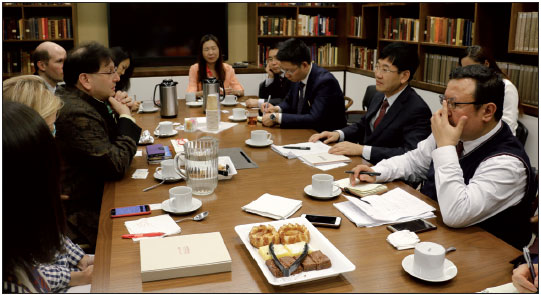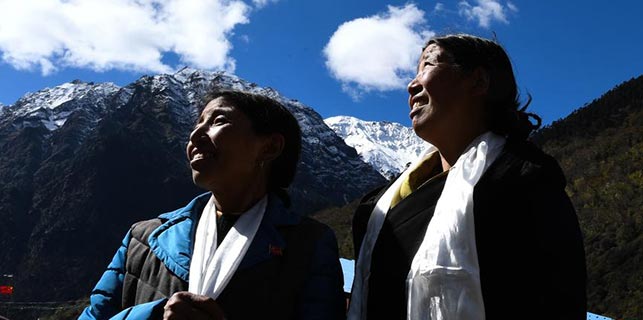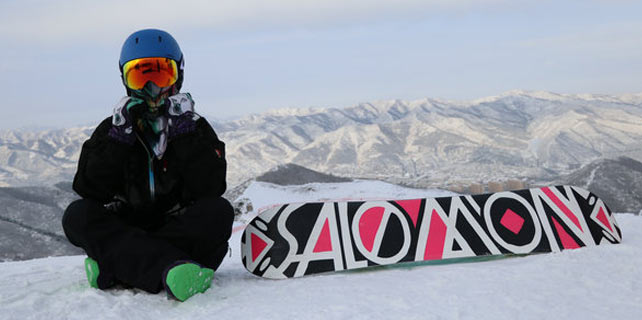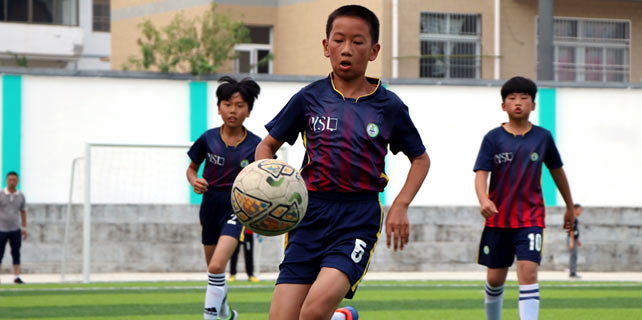Delegation introduces Xinjiang to US
A delegation from China's Xinjiang Uygur autonomous region visited New York on Saturday, promoting mutual understanding and communication by holding discussions with leaders of overseas Chinese communities, local cultural organizations and scholars from local think tanks.
"If you haven't been to Xinjiang, you have no idea how big China is," said Zuo Feng, deputy director of the human rights bureau at the state council information office. "It's better to see it once than to hear about it a thousand times."
During a discussion hosted by the US East Coast Chinese Association Federation, Zuo said that the delegation aims to promote understanding of Xinjiang, especially among scholars in the US.
"We hope to increase people-to-people exchange and cultural cooperation, and deepen understanding and friendship between our two peoples," said Zuo.
Zuo discussed Xinjiang's recent developments in its economy, education, transportation and culture, China's stance on human rights issues and the implementation of ethnic and religious policies in the region.
Zou explained that according to the Belt and Road Initiative proposed by President Xi Jinping in 2013, China will fully leverage Xinjiang's geographical advantages and its role as an important window westward, making it a core of the Silk Road economic belt.
"Xinjiang also plans to create five centers, including a regional transportation center, a trade logistics center, a financial center and a regional medical center," said Zuo.
James Heimowitz, president of the China Institute who visited Xinjiang four decades ago, said he had been impressed by the progress Xinjiang has made. Many Americans have little knowledge of Xinjiang, he said. He suggested the delegation send artists, writers and scholars to hold exhibitions and forums in the US to enhance understanding.
"The only way to develop friendship (between China and the US) is through a deeper trust, and the way to have deeper trust is to have a deeper understanding through language, culture and business," Heimowitz said.
"That appreciation doesn't really come from the formal political level putting forward policies, but from the appreciation at the people-to-people level," he added.
Fred Teng, president of America China Public Affairs Institute, who just visited Xinjiang, said the delegation's visit was a significant way to provide people in the US with a more in-depth understanding of Xinjiang.
"I was very impressed by the convenience of transportation in Xinjiang, it has changed a lot," Teng said. He added that Xinjiang had abundant natural resources and excellent development potential.
The delegation also visited Houston on Oct 26 and 27 before coming to New York and held discussions with scholars, researchers from local think tanks and universities and overseas Chinese.
Zuo also told audiences in Houston about the group's aim to promote understanding among scholars in the US.
At one discussion held at the Asia Society Texas Center, its former chairman Charles Foster said he had visited Xinjiang and was impressed by the friendliness of the people there. He called the discussion meaningful and helpful for researchers to better understand China's ethnic and religious policies.
Consul General of China in Houston Li Qiangmin addressed another meeting held at the University of St. Thomas Houston. He said that the recently concluded 19th CPC Congress has laid out the blueprint for China's future development. China will continue on her path of peaceful development and adhere to the principle of mutual benefit and a win-win strategy, he said.
"The visit of the Xinjiang delegation put such vision into action by furthering exchanges between our two countries," Li said.
Beena George, dean of the Cameron School of Business at University of St. Thomas, said that ethnic and religious policy was closely related to economic development.
"I think it is very wise for China to pay close attention to these issues, because ethnic, religious and cultural environments are important to local long-term economic development and business cooperation," she said.
The delegation heads to Canada next.
Contact the writer at ruinanzhang@chinadailyusa.com
|
A China Xinjiang delegation led by the State Council Information Office visited New York on Oct 28. Zuo Feng (right row, second from the front), deputy director of Human Rights Bureau at the State Council Information Office, briefed James Heimowitz (left row, third from the front), president of the China Institute, about Xinjiang’s recent development and progress during a discussion held by the China Institute in the afternoon. Zhang Ruinan/ China Daily |

















